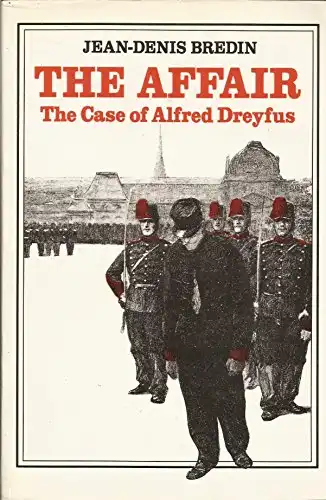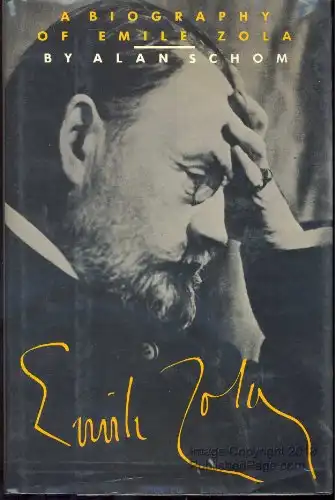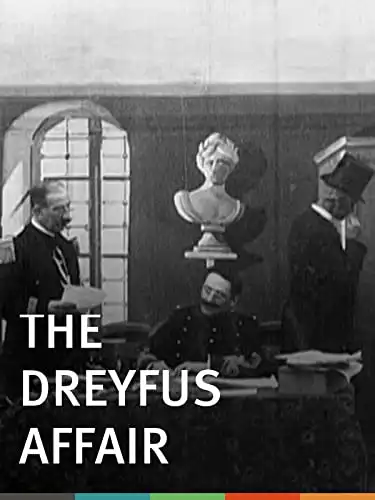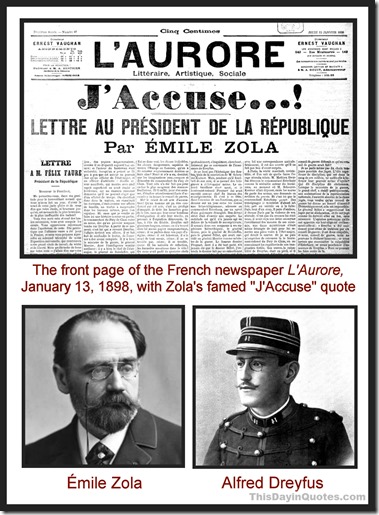 On January 13, 1898, the front page of the French newspaper L’Aurore featured a scathing letter about the “Dreyfus Affair” written by popular author Émile Zola and addressed to the President of the French Republic, Félix Faure.
On January 13, 1898, the front page of the French newspaper L’Aurore featured a scathing letter about the “Dreyfus Affair” written by popular author Émile Zola and addressed to the President of the French Republic, Félix Faure.
The letter was published under huge headlines that said:
J’Accuse…!
LETTRE AU PRÉSIDENT DE LA RÉPUBLIQUE.
Par ÉMILE ZOLA
In English:
I Accuse…!
LETTER TO THE PRESIDENT OF THE REPUBLIC
By ÉMILE ZOLA
In the letter, Zola accused the French government and top military officials of anti-Semitism and of conspiring to unjustly frame, convict and imprison Alfred Dreyfus.
Dreyfus was a Jewish officer in the French Army who was convicted of treason in 1894, for allegedly passing military secrets to the Germans.
The young officer had steadfastly proclaimed he was innocent and, by 1898, clear evidence had surfaced showing he was.
The debate over Dreyfus split French society into warring cultural factions for years, in ways similar to those that have divided liberals and conservatives in America during the Trump era.
Indeed, the Dreyfus Affair involved social and political issues that would still resonate today: racial intolerance, a secret conspiracy by military and government officials, the unlawful conviction and imprisonment of an innocent man, and an example of how protests by outraged activists and revelations in the media can rock the establishment and help lead to justice and cultural changes.
However, the most widely-known legacy of the Dreyfus Affair is Zola’s quote “J’Accuse!” (usually cited without the ellipsis in the actual headline).
It is still invoked in both French and English in public attacks on injustices, lies and malfeasance committed by people in power — though few people today know much, if anything, about the events that inspired it.
The affair started when a French spy found a letter indicating that some French military officer was passing information about French artillery parts to the Germans.
The traitor was a high-ranking officer on the General Staff, Major Ferdinand Walsin Esterhazy. But Esterhazy used phony evidence to put the blame on his subordinate, Dreyfus, who was conveniently of low rank and Jewish.
At the time, anti-Semitism was rampant among the mostly-Catholic French military leaders and public.
Dreyfus had his supporters, but the flimsy case against him was accepted by the military court and most citizens. There was some inconvenient evidence suggesting that Esterhazy was the likely traitor. However, it was generally dismissed as what would now be called “fake news.”
Dreyfus was convicted in December 1894 and sentenced to life in prison on Devil’s Island off of French Guiana. Before being sent there, he was publicly shamed and degraded in a ceremony in Paris on January 5, 1895.
The insignia was torn from his uniform. His sword was broken. He was then paraded past a crowd that shouted things like, “Death to Judas!” and “Death to the Jew.”
During 1896, as Dreyfus suffered through a hellish incarceration on Devil’s Island, a new chief of French military intelligence, Lieutenant Colonel Georges Picquart, found more evidence showing that Esterhazy was the real traitor.
Picquart’s superiors responded by sending him to a post in Tunisia and trying to keep the information he uncovered secret.
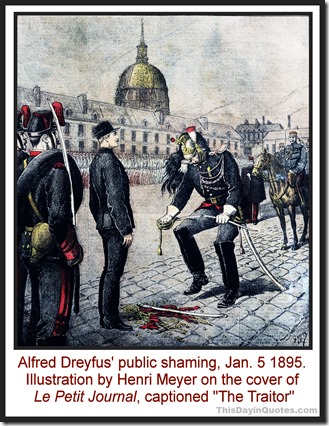 However, reports of the military’s coverup were leaked to the press and eventually Esterhazy was put on trial in a closed court martial.
However, reports of the military’s coverup were leaked to the press and eventually Esterhazy was put on trial in a closed court martial.
Despite the evidence, he found not guilty. This added to the outrage of Dreyfus supporters, which included Émile Zola and many of France’s other leading intellectuals and liberal activists, such as Georges Clemenceau, a long-serving member of the French National Assembly and publisher of the L’Aurore newspaper.
Zola expressed his own outrage in his “J’Accuse…!” letter. In it, he reviewed the facts surrounding the Dreyfus Affair and pointedly named specific military and public officials who were complicit in railroading Dreyfus and letting Esterhazy skate.
Zola used his quickly-famous headline words in front of a series of sentences near the end of the letter, writing:
“Mr. President…
I accuse Major Du Paty de Clam as the diabolic workman of the miscarriage of justice, without knowing, I have wanted to believe it, and of then defending his harmful work, for three years, by the guiltiest and most absurd of machinations.
I accuse General Mercier of being an accomplice, if by weakness of spirit, in one of greatest iniquities of the century.
I accuse General Billot of having held in his hands the unquestionable evidence of Dreyfus’s innocence and of suppressing it, guilty of this crime that injures humanity and justice, with a political aim and to save the compromised Chie of High Command.
I accuse General De Boisdeffre and General Gonse as accomplices of the same crime, one undoubtedly by clerical passion, the other perhaps by this spirit of body which makes offices of the war an infallible archsaint.
I accuse General De Pellieux and commander Ravary of performing a rogue investigation, by which I mean an investigation of the most monstrous partiality, of which we have, in the report of the second, an imperishable monument of naive audacity…
Finally, I accuse the first council of war [i.e., the first military court that convicted Dreyfus] of violating the law by condemning a defendant with unrevealed evidence, and I accuse the second council of war of covering up this illegality, by order, by committing in his turn the legal crime of knowingly discharging the culprit." [Meaning Major Esterhazy].
Clemenceau published the letter on the front page of L’Aurore on January 13, 1898.
As Zola hoped, it fueled increasing pressure to free Dreyfus. It was also a brave act of political activism. He was, in effect, taking on the French military and political establishment and he knew he would be targeted by them for revenge.
Almost immediately, Zola was charged with “criminal libel.” On February 23, 1898, he was convicted and sentenced to a year in prison. Zola refused to serve his jail time and fled to England.
But his “J’Accuse!” letter marked a major turning point in the Dreyfus Affair.
During the summer of 1899, the French military held another trial for Dreyfus and, despite the questionable evidence, found him guilty again. However, public sentiment had started to turn against them in France and around the world.
Anti-French demonstrations sprang up in twenty foreign capitals. Editorials in scores of newspapers in other countries decried the unfair treatment of Dreyfus.
Prior to the end of the second Dreyfus trial, President Faure died. On September 19, the new French President, Émile Loubet, gave Dreyfus a pardon. To save face for the French army brass, Loubet let Dreyfus’ conviction stand.
Thus, even though Dreyfus was allowed to return to France, he was still technically a convicted criminal and lived with relatives under “house arrest.”
Finally, on July 12, 1906, the French Supreme Court declared Dreyfus innocent of treason. He was readmitted to the army and promoted to the rank of major.
Dreyfus served throughout World War I, rose to the rank of lieutenant colonel, and was awarded the Legion of Honor.
He died in Paris at age 75 on July 12, 1935 — exactly 29 years after he was officially exonerated.
Like Dreyfus, Zola returned to France in 1899. He had lived long enough to see President Faure’s right wing government fall and to see the success of his efforts to secure the freedom of Alfred Dreyfus. But he died tragically before seeing the final vindication of his heroic public stand on the Dreyfus Affair. In 1902, he was asphyxiated in his bedroom by carbon dioxide gas caused by a blocked stove flue.
George Clemenceau lived to see his support for Dreyfus and many of his other political views vindicated. He became one of France’s most important political figures, serving as Prime Minister from 1906 to 1909 and again from 1917 to 1920. He died in 1929 at age 88.
* * * * * * * * * *
Comments? Corrections? Post them on my Famous Quotations Facebook page or send me an email.
Related reading and viewing…




